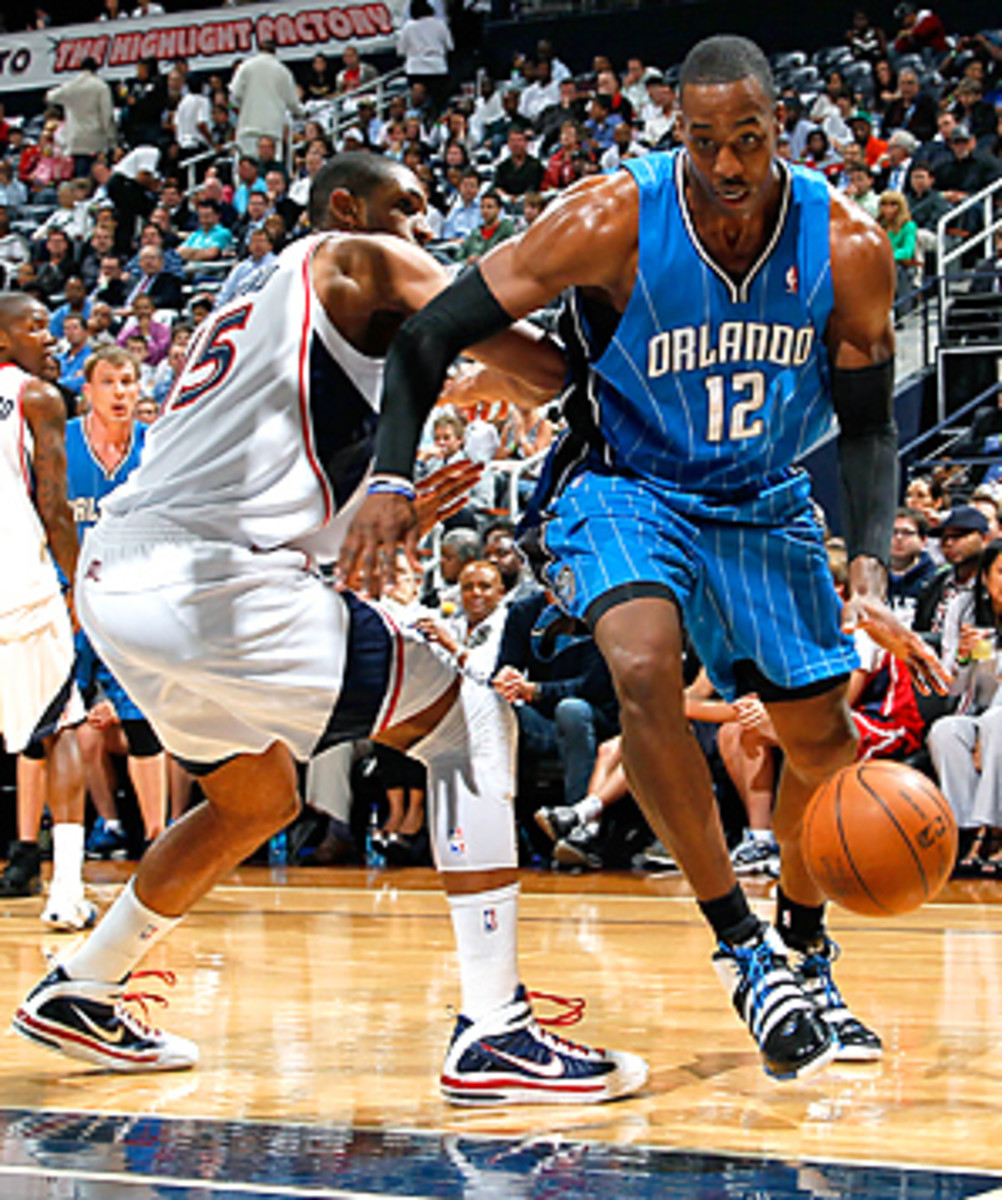Fast Breaks: Magic-Hawks, Game 4
1. Thanks for coming. Unlike Games 1-3, the Hawks actually seemed to try for more than 24 minutes in Game 4; of course, "try" in this case is a relative term after the Hawks lost the first three games by an average of 25 points. But let's be honest: This was a waste of everyone's time, wasn't it? Orlando wasn't tested for any more than three quarters of the series.
Would Milwaukee (which lost to Atlanta in the first round in seven games) have done worse than allowing Orlando to shoot 43.2 percent from three-point range as a road team in Game 4? Would Bucks center Kurt Thomas have let Dwight Howard shoot better than the 84 percent from the floor for the series? Would Brandon Jennings have shot worse than the 29.8 percent Joe Johnson scratched out in four games? The Bucks may not have extended this series any more than the Hawks, but they likely would have brought a greater sense of hunger, of pride. Atlanta played this series as if it knew it was doomed from the start. The Hawks were, but if a team is to have any hope against a team as good as Orlando, it has to believe. Atlanta didn't believe, the team played like it and its fans suffered for it.
2. Orland's secret weapon. Defense. Howard and his supporting cast of perimeter threats led the game recaps, but Orlando throttled what was a good Hawks offense, limiting Atlanta to a combined 37.7 percent shooting for the series and 15-for-51 from long range. Johnson struggled to find any sort of rhythm against the likes of Matt Barnes and Mickael Pietrus. And Mike Bibby was held to 16 points from the starting point guard spot -- for the entire series. Orlando's barrage of threes provided the luxurious scoring margins, but an active and suffocating defense was just as essential to victory.
3. Did Joe Johnson cost himself millions in free agency? Probably not, but that speaks more to the stockpiles of cap space money available this summer than his worthiness. Only two teams are likely to get the only franchise-changing players available, LeBron James and Dwyane Wade; that means a lot of teams will be left with a lot of money and a lot of angry fans if they don't make the type of deal that appears to make all the salary-dumping trades worthwhile. For all of his postseason struggles, Johnson is still a 28-year-old guard with a career 17.6-point scoring average and a good defender. He just isn't a leading man. That isn't a crime; it just means he's not worth a max contract. But with a healthy supply of jilted suitors in the James/Wade sweepstakes itching to make a splash this summer, Johnson could have the opportunity to get whatever contract he wants. But what he should want, especially coming off a max contract, is a spot next to another star or two and a lower-pressure supporting role.
4. Did Mike Woodson lose his job? Maybe. There are good arguments on both sides. On the plus side, Woodson has improved the Hawks for six straight seasons, helped them secure a top-four seed in the playoffs in each of the last two and molded an unrefined talent like Josh Smith into a savvy NBA star. However, Woodson has also presided over a team that was swept out of the second round by double-digit margins in consecutive seasons and also needed seven games to get out of the first round against lesser-talented teams in both years. Perhaps that is why GM Rick Sund addressed Woodson's lack of a contract for next season by telling FanHouse, "Those are things we do in the offseason. ... We've accomplished some things we set out to do. We need to get through the second round if we can."
Now that the Hawks have done that in unceremonious fashion, Sund needs to figure out if Woodson (who has no contract for next season) still has this team's ear. Or if Woodson is willing to revamp an offense whose one-on-one emphasis isn't effective against playoff teams with talent on par -- or better -- than Atlanta's. From the outside, those answers would be easier to ascertain than how to tweak a roster into a step forward next year without a major overhaul. A prediction? The Hawks look for someone who can coax the team from Point B to Point C.
5. Can Orlando be beaten? Recall, if you will, much the same was asked of last season's Cleveland team that had blown through the first two rounds without a loss while the Magic wrestled to get past Philadelphia in Round 1 before struggling to get past the Celtics in seven games. (Orlando went on to beat Cleveland in the conference finals.) Sound familiar to this year's potential scenario, only with the Magic and Cavs switching places?
Look, Orlando has played exquisitely through eight wins, but the Magic haven't exactly been tested, not against the overmatched Bobcats or the vacation-thirsty Hawks. Both Boston and Cleveland offer far more difficult matchups, from size in the middle to length on the wings to defense on the perimeter. Of course, none of those matchups will mean much if the Celtics or Cavs don't play with the discipline the Magic have demonstrated. Orlando's defensive rotations are crisp, rarely revealing an open opponent. The passing on offense is endless, the ball moving until it finds an open target. And the shooting is accurate, punishing double teams on other areas of the floor. In other words, it's going to take a combination of talent, effort and focus to beat the Magic.





